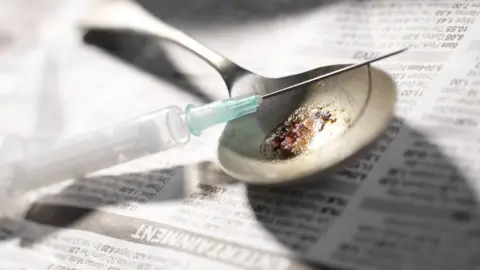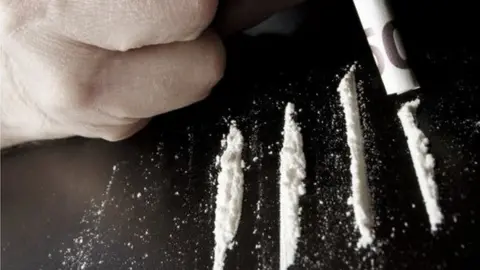Rise in drug deaths due to 1980s inequality, study finds
 Science Photo Library
Science Photo LibraryRising inequality during the 1980s increased the risk of drug-related deaths among members of "Generation X" in Scotland, a new study has found.
Researchers found the "social, economic and political contexts of the 1980s" may have caused an increase in drug deaths in the following years.
The new analysis was carried out by NHS Health Scotland and Glasgow University.
The news comes as the Scottish government convenes a meeting of health leaders to discuss future drugs policy.
The research found a cohort within those born between 1960 and 1980, the group known as "Generation X", who had an increased risk of drug-related death from 1990 onwards.
They also found links to gender and deprivation - young men in poor neighbourhoods were found to be 10 times as likely to die from drugs as women of the same age from a more affluent area.
'Erosion of hope'
Report author Dr Jon Minton, a quantitative research associate at Glasgow University, said similar patterns had previously been reported about the risk of suicide in deprived areas.
His analysis was "consistent with the hypothesis that economic and other policy decisions during the 1980s created rising income inequality, the erosion of hope amongst those who were least resilient and able to adjust, and resulted in a delayed negative health impact".
 Science Photo Library
Science Photo LibraryHe said: "The same kind of pattern we have observed and reported on previously regarding the risk of suicide in vulnerable cohorts in deprived areas in Scotland is repeated, and even more clearly visible, when looking at trends in drug-related death risk.
"For people born in 1960s and 70s, the risk of drug-related deaths throughout the life course was much increased, and gender and area inequalities in these risks increased even more.
"The similarity in trends in both suicide and drug-related deaths suggests a common underlying cause."
Drug deaths in Scotland hit a record high in 2015 with 706 people listed as having died as a result of drug abuse that year. A similar pattern occurred elsewhere in the UK.
Higher risk
The number has been steadily increasing since 1995, when 426 deaths were recorded, and a rising number of deaths have been among older age groups - 73% of the 2015 deaths were of people aged over 35, while the number of those aged under 24 fell.
Dr Andrew Fraser of NHS Health Scotland said the research suggested that the continued increase in drug-related deaths was "likely to be the result of a cohort of people who are at higher risk".
He said: "The full impact of excess mortality in these cohorts with high drug-related deaths is unlikely to be known for some time. It already represents the deaths of hundreds of people prematurely.
"We are hopeful that the findings will be useful in informing current and future policy to help prevent the creation of further cohorts at greater risk of drug-related deaths in Scotland."
